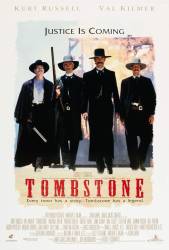Revealing mistake: When Wyatt and the others leave two cowboys hanging in front of the Dragoon Saloon, you can see that neither man actually has a rope on his neck. As the one man swings around, on his vest you can see the outline of the rope going straight down into the harness that's holding him. (01:25:35)
Revealing mistake: When Wyatt Earp and the actress, whom he marries later in the movie, meet on horseback, they go on a fast paced ride that concludes after going down a steep hill. If you look at the actress' feet, you will see she is riding side-saddle - a very difficult feat considering the riding they do. If you look closely you can see her real leg, safely on the other side of the horse. The side-saddle leg must be fake.
Revealing mistake: When Morgan dies his eyes are wide open. As Wyatt lays him down rolling his head to the side Morgan's eyes continue to focus at the ceiling instead of turning with the motion of his head as dead eyes would do.
Revealing mistake: In the "showdown" scene between Johnny Ringo and Doc Holliday, a close up of Johnny's eyes reveals the visible outer edges of contact lens.






Suggested correction: But Hucleberry Finn appeared in Tom Sawyer in 1876 and was a bad influence on, or "made trouble' for Tom.
Not sure what this correction is trying to state, but "I'm you're Huckleberry" was slang in the late 1800's for "I'm your man" and didn't derive from Twain or Huck Finn. Twain uses the earlier slang meaning of huckleberry for Finn, meaning an inconsequential person, to establish Finn is a boy of lower extraction or degree than Tom Sawyer.
Bishop73